Dion DiMucci
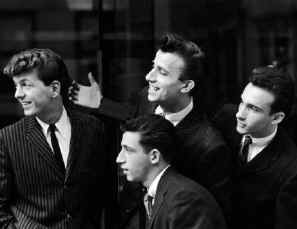
(clockwise from the left) Dion DiMucci, Angelo D'Aleo,
Fred Milano, Carlo Mastrangelo
The most successful white doo wop group, Dion and the Belmonts
were perhaps the sauciest of New York City's late-fifties white
teen idols. Dion DiMucci broke from that clean-cut pack
with an engagingly cool, streetwise swagger epitomized by
"The Wanderer."
Members:
Dion DiMucci - lead
Angelo D'Aleo - first tenor
Fred Milano - second tenor
Carlo Mastrangelo - bass

Pasquale and Frances DiMucci circa 1940
|

Working on dancing puppet, 1955
|
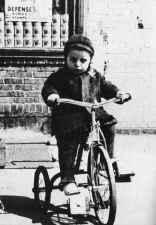
At age three
|

At age 12
|
Dion DiMucci was born July 18, 1939 in the
Bronx the eldest of the three children of Pasquale and
Frances DiMucci. He had two sisters Joanie and Donna. His
father was a professional puppeteer who spent his summers
performing in the Borscht Belt, a collection of lounges, theaters
and hotel showrooms from Boston to Philadelphia. Frances did
piece work in the garment district.

Singing to Tony Bennet Hank Williams's Cold Cold Heart
He began singing at the age of five. A few years
later he would hear Hank Williams and fall in love with Hank
Williams's Honkey Tonk Blues. His Uncle Lou would then buy him a
guitar and teach him a few chords. His father introduced
him to Paul Whitman, a 1920s bandleader who by the 1950s, was
best known for discovering and promoting young talent. At about
twelve Dion began appearing with Whitman on radio and television
programs along the East Coast, including Whitman's own Teen
Club.

As a teenager Dion had two things, other than girls, to occupy
his time when he wasn't in school. One was the local gang, he
belonged to the Fordham Baldies. The other was spending evenings
singing on street corners.

Dion and mother 1959
Early in 1957, Dion booked some studio time and recorded four
rock and roll songs as a Valentines Day present for his mother.
The demo reached the producers of Teen Club TV show out of
Philadelphia, where he made his performing debut in 1954.
Dion's reputation eventually spread far enough to reach Irv
Spice who owned Mohawk Records. Using unknown studio musicians
and backing vocalist Dion recorded "The Chosen Few" and
"Out Of Colorado." After selling a few copies locally
it was released by Jubilee, a larger New York record company.
However, it was still unable to find an audience.

L-R: Angelo D'Aleo, Fred Milano, Carlo Mastrangelo
|

Belmont Avenue
|
When approached by Spicer to record a second
single Dion said he'd only do it with his own backing group.
Spicer agreed and Dion found the three best street singers he
knew. Two were Carlo Mastrangelo and Freddy Millano, members of
rival gang, the Imperial Hoods. Along with Angelo D' Aleo they
made up the Belmonts named after Belmont Avenue.
Dion began listening to street doo wop and composing in this
style, and in early 1958, Mohawk issued "Tag Along" b/w
"We Went Away."
With a sound that was raw and crude it's no wonder that few
records were sold. However, they served another purpose. The
opened the door for them to join another record company.

In 1958 Bob and Gene Schwartz, Elliott Greenberg and Allen
Sussel began Laurie Records. Gene Schwartz had written "Tag
Along," so when looking for an opening act for Laurie,
Schwartz looked no further than Dion and the Belmonts. Laurie
Record's first single "I Wonder Why" was recorded on
afternoon at New York's Bell Sound Studios. Dion's vocal was
slightly flat with slight nasal overtones - a style that would
become his trademark, but the Belmonts were right on the money.
"I Wonder Why" wasn't really what Dion and the Belmonts
were all about, but it made people sit up and listen.

On Dick Clark
Left to Right: Fred Milano, Dick Clark, Carlo Mastrangelo and
Dion Dimucci
Released the first week of May, 1958 it was on the national
charts two weeks later. Before the month was out, they were on
Dick Clark's Saturday night CBS-TV show. For Dion, there would be
no turning back. Immediately they were booked on a one-nighter
tour that crisscrossed the country. He also began dabbling in
drugs where he picked up a heroin habit that he didn't kick until
1968.

The Belmonts second single "I Wonder Why" was a hit,
almost making the Top Twenty. "No One Knows" and
"Don't Pity Me" followed, but the Belmonts big break
out hit came in the spring of 1959 with "A Teenager in
Love" (#5). The next year "Where or When" made it
to #3.
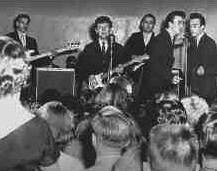
Playing guitar at the Winter Dance Party
The Belmonts toured frequently, often on package tours with
other stars. In February 1959, Dion passed up a plane ride on the
chartered plane that later crashed, killing Buddy Holly, Ritchie
Valens, and the Big Bopper.
On February 3, 1959, after playing a concert in Clear Lake,
Iowa, Holly decided to charter an overnight flight to the next
venue rather than travel on the tour bus. Dion was invited to
accompany him but decided that he would not spend $36 ($382 in
2024) for the flight, as he considered 36 an unlucky number ($36
was the same monthly rent his parents paid for his childhood
apartment) and he could not justify the indulgence. The plane
crashed, killing all on board: Holly, Valens, Richardson and the
pilot Roger Peterson. Dion and the Belmonts continued on the
tour, along with Frankie Sardo, Waylon Jennings.
By the early 60s Dion and the Belmonts had broken up. The main
reason was Dion's heroin habit which he had been nurturing since
he was sixteen. At first, those around him tried to cover it up.
In October 1959, While "When and Where" was nearing the
top of the charts, Dion was hospitalized; in an attempt to kick
the habit. Variety magazine quietly noted that he had been
ordered by his doctor to "take a leave of absence." The
outward impression was that Dion was overworked.
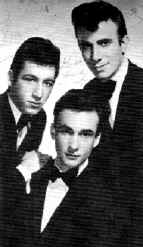
The Belmonts
(L- R) Angelo D'Aleo, Fred Milano, Carlo
Mastrangelo
The cohesiveness of the group was gone. Dion was busy with his
new music publishing firm, Donna-Joan Music, named after his
sisters. The Belmonts decided they could make it on their own and
in the summer of 1960 they broke with Dion. Their first single on
Laurie was "We Belong Together," but it failed to catch
on. They moved to Surprise Records for "Tell Me Why"
which was a nice up-tempo ballad, much like their earlier ones
with Dion. In the spring of 1961, "Tell Me Why" was
switched to Sabrina and eventually entered to Top Twenty.
The Belmonts released a dozen singles on Sabrina in 1964. Sales
were moderate to good along the East Coast, and their hits
included "Don't Get Around Much Anymore" and "Come
On Little Angel."
In an attempt to exert his independence, Dion's first three
solo singles were distinctly different than those done with the
Belmonts. "Lonely Teenager" featured a backing group
with a female lead. With a bouncy rhythm it was near the Top Ten
in the late fall of 1960. "The Kissing Game" an over
produced record was another complete departure and was a
disaster. Finally "Somebody Nobody Wants" was a tired
record and it was obvious that a change was needed.
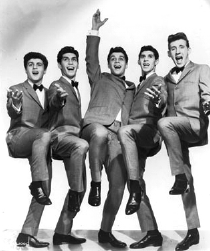
The Del-Satins
By early 1960 the unaccredited Del-Satins brought in to sing
background vocals in the style of the Belmonts. He had Top Ten
hits with "Runaround Sue" (#1), "The
Wanderer" (#2), "Lovers Who Wander" (#3), and
"Little Diane" (#8) in 1962 .
With his contract up with Laurie in June, 1962, Dion jumped to
Columbia. He brought along the Del-Satins and had hits with
"Ruby Baby" (#2) "Drip Drop" (#6), and
"Donna the Prima Donna" (#6) in 1963. By this time he
was recording for Columbia Records. Dion also appeared in the
film Teenage Millionaire in 1961.
DiMucci dropped The Del Satins in late 1963. In 1964 Dion
released a string of unsuccessful covers and then began recording
blues material around 1965 with little commercial success.

In 1967 he reunited with the Belmonts and they recorded
"Mr. Movin' Man," "Berimbau," and an album Together
Again for ABC Records in 1968. In early 1968 he moved with
his wife and daughter to Miami, where with the help of his
father-in-law, he finally kicked his heroin habit. Later that
year he recorded the "Abraham, Martin, and John," a #4
hit ballad tribute to Lincoln, King, and Kennedy. The follow-up,
a cover of Jimi Hendrix's "Purple Haze" only reached
#63 on the charts.
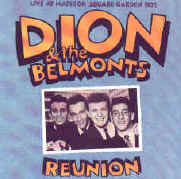
The next few years was spent on the singing in coffeehouses.
Now with Warner Brothers, his debut album, Sit Down Old
Friend, featured just his voice and acoustic guitar on eight
songs. He next released was the anti-drug single "Your
Own Backyard." Neither sold well, and Dion reunited with the
Belmonts. The group played Madison Square Garden in mid-1972, as
documented on the Reunion album. Dion briefly re-entered
the show business mainstream, frequently appearing on TV variety
shows. In the mid-Seventies Dion with Phil Spector recorded Born
to Be with You, but it was only released in the U.K.
Dion returned to rock and roll in June 1987 with a series of
sold out concerts at Radio City Music Hall. His autobiography The
Wanderer was published in 1988. In 1989 with the assistance
of Paul Simon, Lou Reed, and k.d. lang, Dion recorded Yo
Frankie under producer Dave Edmunds, managing a minor hit
with "In the Still of the Night." In 1990 he
toured with Edmunds, Graham Parker, and Kim Wilson of the
Fabulous Thunderbirds. By the mid-90s Dion had moved back to New
York and formed the group the Little Kings with guitarists Scott
Kempner of the Dictators and Del Lords, bassist Mike Mesaros of
the Smithereens, and Frank Funaro of the Del Lords for
engagements on the East Coast.

In October 2009, Dion performed "The Wanderer" with
Paul Simon at the 25th Anniversary Rock and Roll Hall of Fame
Concert.

In 2013 he was awarded an honorary doctorate in humanities
from Fordham University.

|

Performance of The Wanderer, Paper Mill Playhouse,
Milburn, New Jersey
|
In a December 2011 article from The New York Times,
Dion and his collaborator (writer and director Charles Messina)
discussed details about the project – titled The
Wanderer: The Life and Music of Dion – which would focus
on the years between 1957 until the late-1960s. It was planned to
feature more than twenty songs from that era, as well as new
original music.
DiMucci revealed that Michael Wartella would be starring in The
Wanderer on December 16, 2017. There was a reading of the
musical in November 2017, while working on the play continued .In
December 2019, it was announced that New Kids on the Block member
Joey McIntyre would star as Johnny, Michael Wartella as Dion and
Christy Altomare as wife Susan. The first performance at the
Paper Mill Playhouse was scheduled to start on May 28, 2020 Due
to the COVID-19 pandemic, the opening performance was rescheduled
to March 24, 2022

Dion was inducted into the Rock and Roll Hall of
Fame in 1989.

Dion 2018
Dion and the Belmonts were inducted into the Vocal
Group Hall of Fame in 2000
Fred Milano passed away from lung cancer January 1, 2012 at
the age of 72.
Carlo Mastrangelo passed away April 4, 2016 at the age of 78.
























